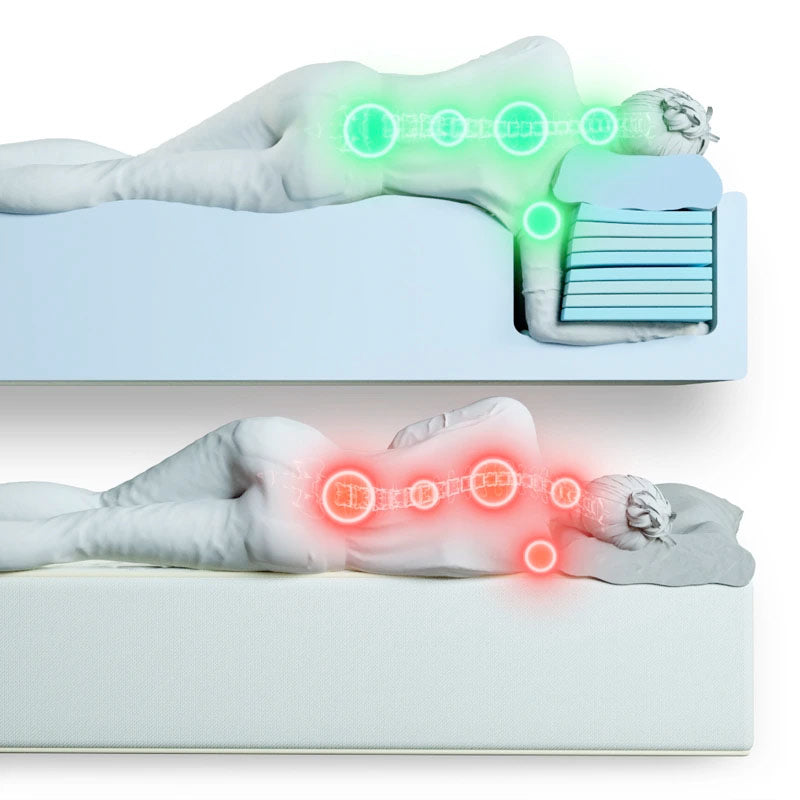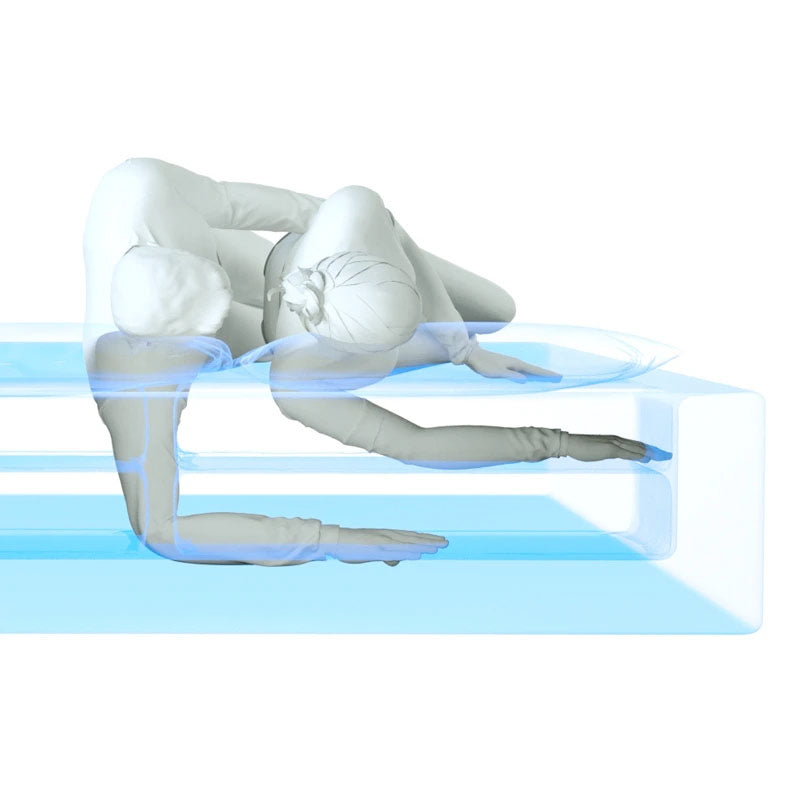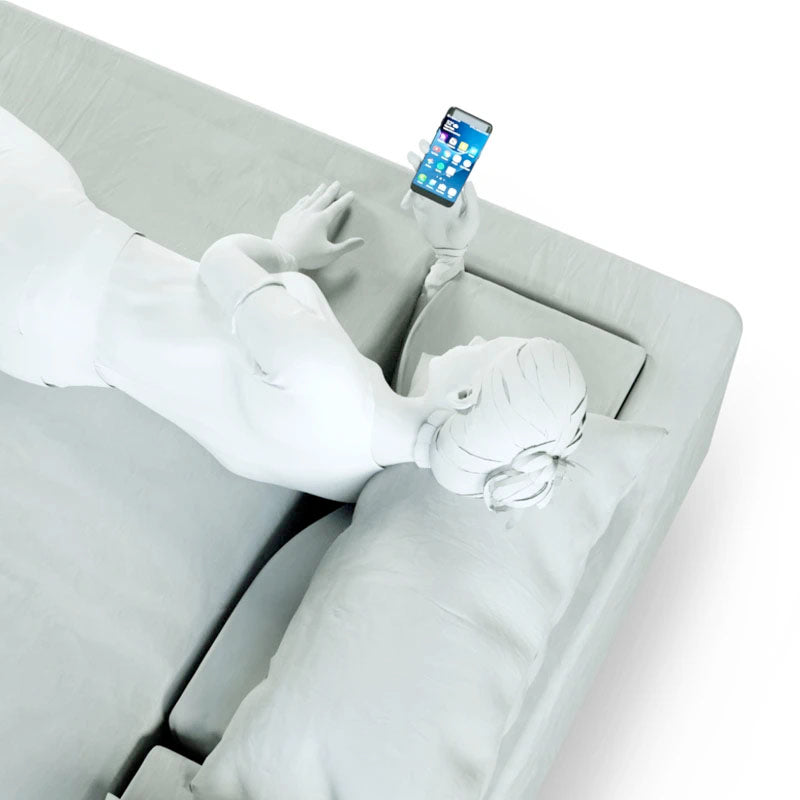Imagine getting up from a long night of sleeping on your side only to discover that your ribs hurt. What gives?
As it turns out, rib pain is fairly common, and it can be caused by various factors. Some of these causes are quite serious, but rib pain can also result from benign factors like your sleeping position. Today, we’ll introduce you to common causes of rib pain and what you can do to treat your aches and pains.
Sleeping in one position frequently on a poorly constructed mattress can lead to pain and muscle imbalance. When you first start feeling pain, check out your bed and see if it’s time for an upgrade.
If you’re a side sleeper who experiences aches and pains, SONU Sleep has come up with a bed that will help alleviate it. Read on as we explore rib pain and how the SONU Sleep System can help you sleep more comfortably.
What Causes Rib Pain?
Rib pain can result from many different factors, some of which are more serious than others. If your rib pain only occurs after sleeping, you may want to consider your sleep position. Sleeping on your side can put excessive strain and pressure on your ribcage, arm, and shoulder and thus may be the cause of your aches and pains in the morning.
If you have a traditional flat mattress, this may exacerbate your pain even more. Consider upgrading to the SONU Sleep System to enjoy the revolutionary patented Comfort Channel and sink-in support system with a top layer of plush serene foam, resulting in an unforgettably comfortable sleeping experience.
That said, rib pain can sometimes be the result of something more serious. Here are a few other causes of rib pain.
Costochondritis
Costochondritis develops when the cartilage that connects ribs to the breastbone becomes inflamed and/or swollen. Symptoms of this condition are pain in the chest wall or feeling like you’re about to have a heart attack.
Pulmonary Embolism
A pulmonary embolism is a blood clot that travels through the bloodstream and into the lungs. This can occur after an injury, surgery involving the heart, or cancer. Symptoms include chest pain, shortness of breath, and swelling.
Fibromyalgia
Fibromyalgia is a pain that spreads throughout the body. More women are diagnosed with this disorder than men. If you have a history of rheumatoid arthritis, lupus, or osteoarthritis, you could be at risk for developing fibromyalgia.
Lung Cancer
When we think of lung cancer, we think of a prolonged cough or pain in the lungs. Did you know that the pain could also be felt in the ribs?
If you feel persistent pain in your rib cage along with difficulty breathing, go to your doctor to rule out lung cancer.
Intercostal Muscle Strain
Tears in the intercostal muscles result in intercostal muscle strain. Our intercostal muscles help us breathe when we do physical activity, like sports.
There are internal and external versions of these muscles, and they contract when we breathe in and out. Sports that require a lot of upper body movement can cause this injury.
Slipping Rib Syndrome
If your ribs move more than usual and you experience pain in your lower chest and upper abdomen, you might be experiencing slipping rib syndrome.
The condition is also called interchondral subluxation, painful rib syndrome, and clicking rib syndrome. People usually experience it after an injury such as a fall, sports accident, or rapid movement like throwing objects.
How Can I Treat Rib Pain?
If you have an illness like cancer, a doctor will provide you with a treatment plan. You may undergo surgery or radiation treatments. Likewise, with any disorder of the ribs, consultation with a doctor is necessary to learn how to help you.
However, for general rib pain, there are some things you can do to help yourself treat pain at home.
Pain Relievers
If you experience mild rib pain, you may be able to take an over-the-counter (OTC) pain medication like ibuprofen or naproxen. If your pain is worse, your doctor may prescribe you a stronger pain reliever.
Heat Therapy
Applying heat to your painful ribs could reduce your pain. This might include the use of a heating pad, hot water bottle, pain patches that get hot, like IcyHot, or other treatment.
Cold Therapy
Your doctor or physical therapist may recommend that you use ice, cold water bottles, or other cold compresses on your ribs.
Chest Braces
In some cases, you may be asked to wear a brace or chest binder to stabilize your painful ribs.
Physical Therapy and Exercise
Your doctor may recommend that you go to physical therapy or exercise classes to help get rid of your lung pain. For example, people living with fibromyalgia may be told to take up gentle exercises like Tai Chi or yoga.
Surgery
To repair damaged ribs or the surrounding muscles, you may have to undergo surgery.
Rest
Movement can make some rib pain even worse, so you may have to limit your movement a bit or refrain from doing certain activities until you heal.
Upgrade Your Mattress
Sleeping on a foam mattress can help prevent and reduce your rib pain. Like the one offered by SONU Sleep, these mattresses conform to your body’s curves without adding additional pressure on your bones.
The SONU Sleep System, in particular, includes a mattress made of 26 layers of top quality, high resilience foams enveloped in cooling serene, one of the most comfortable foams on the market today.
Conclusion
If you’ve experienced rib pain after sleeping on your side, it may be time to talk to your doctor. Your pain could be hiding an underlying issue like an injury or illness.
No matter your diagnosis, your doctor will likely agree that sleeping on a supportive bed is crucial no matter your diagnosis. That’s why SONU’s mattress for side sleepers is made of durable foam and contains an immersive Comfort Channel for your arms and shoulders.
With sink-in support to align your spine and support your every move, SONU can help you enjoy an unforgettable night of sleep.
Sources
Is Your Sleep Position Causing You Back Pain? | Cleveland Clinic
Costochondritis - Symptoms and causes | Mayo Clinic
Slipping rib syndrome | UCSF Health
Tips for Sleeping with Intercostal Muscle Strain | Sleep Foundation
What Is Lung Cancer? | Types of Lung Cancer | American Cancer Society
Fibromyalgia | American College of Rheumatology






















